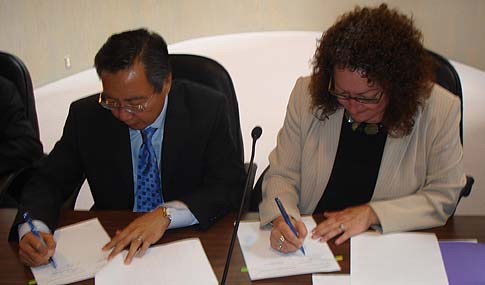|
By Olin Ericksen
Staff Writer
May 22 -- Billed as the beginning of a new era of
collaboration, School District and Santa Monica College officials
Monday signed an agreement to help high school students who
never gave college a thought find their way to a secondary
education.
Ultimately aimed at helping close a well-documented achievement
gap between rich and poor, white and minority students, Santa
Monica College President Dr. Chui L. Tsang and Santa Monica-Malibu
United School District Superintendent Dianne Talarico put
pen to paper on a host of new agreements between the two local
institutions.
 |
| Santa Monica College
President Dr. Chui L. Tsang and Santa Monica-Malibu United
School District Superintendent Dianne Talarico sign agreement
at District headquarters Monday. (Photo by Olin Ericksen) |
From use of athletic fields and classrooms to unprecedented
access to professors and courses at the college for some still
too young to drive, District students will be the ones to
primarily benefit from several new initiatives that could
be in place as early as the next school year, officials said.
Money to fund the new programs, officials noted, still needs
to be secured from outside sources.
"The signing of this agreement today is just the first
step of many, many collaborative projects we want to work
on in the future," said Tsang, who sat with Talarico
at District headquarters flanked by staff and board members
from both the College and District.
"This is an historic move that greatly increases college
course offerings to an even wider variety of high school students
in the unified school district," said Tsang.
"We want to make sure that all of our kids have access
and are prepared so they can make a choice about whether or
not they can attend college," said Talarico.
"The (agreement) represents a natural collaboration
between our two academic institutions and will provide the
groundwork for increased success for our high school students,
increasing the number of students wishing to pursue post-secondary
education."
Preparing High school students early on in English and math
courses, expanding college-level classes in primary education,
increasing career and technical education programs at the
College and offering more summer courses at the College for
teens are some of the programs included in the agreement.
Perhaps the most difficult programs to initiate, also could
be the most important in helping economically disadvantaged
students go to college, officials said.
The High School Transfer Academy would target junior and
seniors who are "first-generation college attendees"
to enroll them in simultaneously in the College and high school.
"The intent is to look at the first generation college
attendees," said Dr. Sally Chou, The District’s
chief academic officer. "That's our first priority, and
then (to look) at students who are less affluent, or less
fortunate."
Scheduled to begin next year with 100 high school freshmen
who will be tracked through graduation, a separate program
dubbed an "Early College High School Program," would
give students grades 9 though 12 a chance to develop an academic
theme, learn research-based study techniques and use technology.
While detail have yet to be worked out, school officials
said they would work with the community, parents and faculty
to chart a course for the program.
"The goal is one hundred students a year," said
Talarico, who said the program has been instituted in several
other communities nationwide.
"It has been more successful in some places than others,"
she said.
Chou -- who Talarico said was hired as a "task-master"
to help push through the agreement -- said both the Early
College High School Program and High School Transfer Academy
are aimed at helping address a longstanding problem in California
schools.
"We are trying to close that achievement gap,"
said Chou. "We have to target those groups of students
who traditionally have not had that opportunity."
As for funding, District officials said they will need to
press for outside help, because neither the District nor the
College plans to dip into their general funds for the initiatives.
"We have to go out and get grants," said Cho.
The next step, said Talarico will be to bring the programs
to the community and, perhaps more importantly, the teachers
and faculty to iron out the details.
"We have to get the faculty association and teacher's
association at the table so we can look at whatever the obstacles
and barriers are (there), so we can focus and increase the
access for students that don't typically say that college
is for them or that their parents don't know how to navigate
the system for them," Talarico said.
|